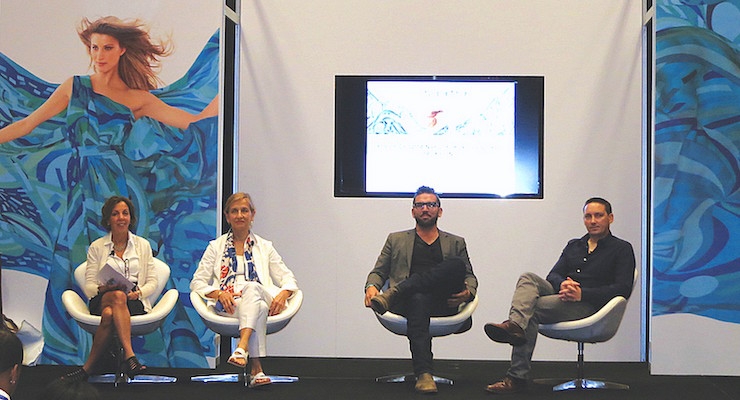
2016-08-31 11:27:57
Sustainability in Beauty: More than Green Packaging
2016-08-31 11:27:57

What does the future of sustainability look like—and what are some iconic brands doing at the moment?
To get an inside look at how some brands are thriving in the green space, with everything from packaging to corporate social responsibility, Beauty Packagingcalled upon the expertise of industry master brands Method and Pangea, set amidst an overview of lifestyle trends brought to the crowd by PeclersParis, a trend forecasting, brand strategy and product innovation & development consulting agency.
Dominique Assenat, global creative director, Beauty, Cosmetics & Colors, PeclersParis, began the discussion by presenting an insightful perspective of societal trends and consumers’ direction toward overall green living.
She explained that what people are putting into their bodies (influenced by the natural and organic foods trend) continues to spill over into their concern for the planet—and the packaging and products that they use.
Assenat gave evidence that more sustainable value is coming through socio-cultural trends and innovation, as well as brand strategy and innovation. Ultimately, she said, “A sustainable approach surrounds the Earth’s eco system.” She pointed to an overall approach to health and beauty: that everything is alive and working together.
“The body is a living eco-system and impacts lifestyle,” said Assenat. As proof that consumers are moving in this direction, she looked at gastronomic and detox trends, yoga and fitness—and also referenced the growth of probiotics in skin care to nourish and protect, as well as Amazon’s online store for products dedicated to people with skin sensitivities and allergies. The evolving vegan products/lifestyle, too, she said, is becoming premium as well as mass/supermarket.
The Real End User
Joshua Onysko, founder/CEO of Pangea Organics is recognized as a skin care authority with a high-performance, natural product line created with organic superfoods sourced from 54 countries. He founded Pangea Organics in 2000, and is known for his philosophy that inspires the industry to “think outside the landfill.”
Pangea became the first company to introduce biodegradable, compostable, plantable and origami fold packaging. The Pangea products are never made using petrochemicals, parabens, GMOs, or other synthetic or harmful ingredients.
Onysko said his global travels led him to think of sustainability throughout the entire supply chain. He believes the real end user is the Earth. He based his cosmetics on super foods. He created plantable packaging by looking at egg carton crates, then embedded the molded fiber with non-invasive plant seeds. Pangea packaging utilizes brown or green glass so formulation efficacy is not compromised by light. Bottles are screen printed to prevent waste and so as not to hinder recycling. Onysko believes that going forward, there must be a focus on transparency and truth in labeling. “Brands must be honest because consumers are smarter,” he said.
Using Business to Solve Social and Environmental Issues
Rudi Becker, senior director, Packaging and Industrial Design, Method Products spoke about the Method brand, founded in 2000, and known as being “the pioneer of premium planet-friendly and design-driven home, fabric and personal care products.”
Becker said that Method’s founders first saw an opportunity in the Clean Space, with cleaning products, where not much had changed and many were toxic and not well-designed. Their product range expanded, and Hand & Body products now comprise about 35% of Method’s business. Not only do the products work well (1st priority), but they are also designed to have a pleasing countertop appearance. Method is a B corporation, which means it uses business to solve social and environmental issues.
The brand uses recycled content and a cradle-to-cradle philosophy, ensuring that packaging can go back into the recycling stream. Becker said human health, environmental health, sustainability, packaging health—are all taken into consideration. He also described Method’s fascinating project in which they gathered plastic littered in the ocean and on beaches and recycled it into packaging for their Ocean Plastics line.
Method goes far beyond packaging with its efforts toward social responsibility and sustainable practices. The company chose to build a manufacturing plant in the economically challenged south side of Chicago in order to change the scene a bit and offer job opportunities for locals. In addition, the Leed platinum certified factory features a greenhouse on the roof, which not only helps with heating and cooling the facility, but provides freshly grown produce to nearby residents.
The takeaway: Developing and holding true to a commitment to use eco-friendly packaging and formulations while maintaining a true social consciousness and corporate sustainability ethos is not easy. It requires the founder’s DNA and unwavering intent in order to succeed.
LinkedIn




